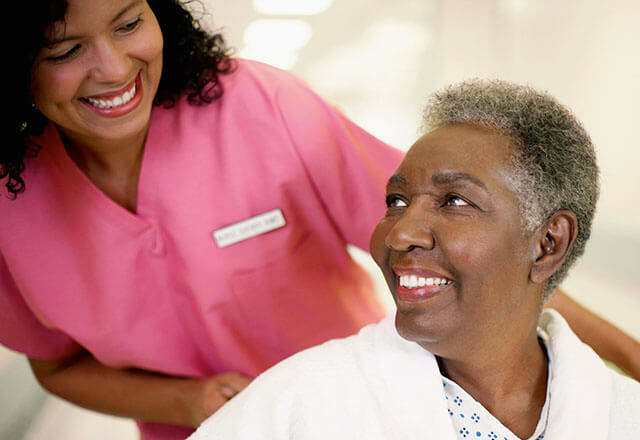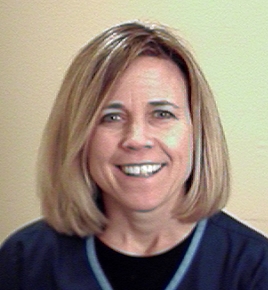Hospital Inpatient Experience
A positive patient and family experience while in the hospital often results in better overall health outcomes for the patient. Clear communication from health care providers helps patients and families understand how to best manage their health and lower the likelihood of readmission to a hospital. A standardized national survey sent in the mail to adult patients asks about their experience of care at the hospital.
What is this measure?

Johns Hopkins Medicine monitors patient experience survey results as one way to ensure patients and families have a positive experience.
A standardized national survey called the Hospital Consumer Assessment of Healthcare Providers and Systems (HCAHPS) is mailed to some patients after discharge to provide their perspective of how they experienced care from the hospital.
The survey asks adult patients questions about clear communication, discharge planning, the hospital environment and the patient’s overall experience.
Patient responses are submitted to the Centers for Medicare and Medicaid Services, which publicly reports the annual results from all U.S. hospitals online at Care Compare.
Examples of HCAHPS survey questions:
- During this hospital stay, how often did nurses treat you with courtesy and respect?
- Before giving you any new medicine, how often did hospital staff describe possible side effects in a way you could understand?
- During your hospital stay, did hospital staff talk with you about whether you would have the help you needed when you left the hospital?
Patients have the choice of responding with always, usually, sometimes or never. The percentage of “always” responses are shown in the data graphs below.
Why is it important?
HCAHPS survey questions are designed to measure how often key components of a hospital admission happen. Patients and families can use HCAHPS survey results to objectively compare hospitals locally or nationally on inpatient perspectives on delivery of care.
Many of the questions ask if the patient received clear communication from health care providers. This information is critical for patients and families so they can understand how to best manage their health. For example, patients who fully understand their discharge instructions typically have better overall health after discharge and have a lower likelihood of a hospital readmission.
What is Johns Hopkins Medicine doing to continue to improve?
Patient- and family-centered care is a key focus for Johns Hopkins Medicine. Each hospital has teams devoted to the highest level of service excellence and patient satisfaction.
Supporting Families
The Johns Hopkins Hospital implemented 24/7 visiting hours on all units. This was done to keep families near their loved ones during a hospital stay. New areas of the hospital include private rooms and sleep furniture for one family member to stay in the patient room at night.
Patients and families coming to the emergency room at Johns Hopkins hospitals are promptly greeted by a staff member to help direct them where to go and to reduce the patient’s anxiety.
Listening to Patients
All Johns Hopkins Medicine hospitals seek regular feedback directly from past patients and families through Patient and Family Advisory Councils. The Councils bring former patients and family members together with hospital leaders and staff to address patient experience needs and develop new ideas for improving patient care and communication.
Executive leaders also make rounds on patient floors to informally ask patients and families about their experiences. This helps give leadership a view of what is going well and what areas need improvement.
Frontline Perspective

As an intensive care nurse, Brigid Linsenmeyer recognizes that both the patient and their loved ones face a health care crisis together and strives to comfort and involve them as much as possible.
Brigid Linsenmeyer, R.N., P.C.C.N.
Registered Nurse, Johns Hopkins Howard County Medical Center
“Working in an intensive care unit (ICU), the best parts of my job are getting to know my patients and their loved ones and making them feel safe and comfortable. Any gesture of compassion that we can offer to show that we care means a tremendous amount to our patients and their loved ones.
To improve the patient’s experience, we encourage families to get involved in our daily multidisciplinary rounds. This collaboration helps ensure that all members of the care team and any family members present understand the patient’s goals for the day. We have also developed guidelines so that the nurses change shifts at the patient’s bedside instead of at the nurses’ station.
We make great efforts to foster open communication between the care team and the patients and their loved ones. One of our patients recently had a long stay in the ICU. His spouse was extremely supportive and involved with his plan of care. She greatly appreciated being able to participate in rounds each day and valued being ‘part of the team.’ She received answers to her questions, advocated for her husband, and began planning for the care and therapy he would need in the weeks following his ICU stay. Her involvement empowered her to get to know the care team and to hear directly from them about the rationale for decisions regarding her husband’s care.
In my work, it is important to me that I provide a high level of care and compassion to my patients and their families each day. Knowing that someone cares and is listening does make a difference!”
How can patients and families support safety?
Knowing about your health condition, medications and plan for future care are critical for keeping you healthy. If you are unclear about anything regarding your health condition or treatment, ask your health care team for help. You also can contact a patient advocate if you feel any concerns are not being addressed.
For more information
- Centers for Medicare and Medicaid Services' Care Compare
- Johns Hopkins Medicine patient care website
Patient Resources
- Johns Hopkins Medicine’s Patients’ Rights and Responsibilities
- Johns Hopkins Medicine’s Patient Education Portal
- AHRQ Guide: Questions to Ask Your Doctor
Quality and Safety Performance During COVID-19
The organization’s quality and safety performance may have been impacted by the COVID-19 pandemic. We would urge patients to consider more recent performance in combination with historical performance. Patients may benefit from discussing with their healthcare provider the disruptions COVID-19 may have caused on quality and safety of care.
See how Johns Hopkins Medicine prioritizes safety during the COVID-19 pandemic.
